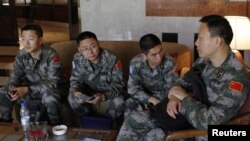Syrian government troops pounded the rebel stronghold, Rastan, and parts of the flashpoint city, Homs, Friday, amid widespread anti-government protests across the country. Meanwhile, the head of the United Nations observer forces urged both the government and the opposition to engage in dialogue to end the violence.
Witnesses say Syrian security forces fired tear-gas and live rounds to break up a student protest in Aleppo Friday. The demonstration was billed as the largest of its kind in Syria's northern commercial hub since the uprising against President Bashar al-Assad began in March 2011.
The protests come after Syrian security forces disrupted a student demonstration in Aleppo on Thursday. Video taken from a U.N. vehicle in Aleppo Thursday showed security forces beating student protesters.
On Friday, Syrian state television showed an empty boulevard in front of Aleppo University's medical college, saying there were “no significant demonstrations.” But video posted by opposition groups on the Internet showed large crowds gathering in the streets.
Arab satellite channels also broadcast large protests in parts of Idlib province, Homs, Daraa and the capital, Damascus. Signs held up by the protesters called for “solidarity” with the student demonstrators in Aleppo.
Syrian government troops fired heavy artillery at Rastan Friday. Several videos showed shells hitting parts of the city. Other videos showed government troops shelling parts of nearby Homs.
In Damascus, the head of the joint U.N.-Arab League observer team, Norwegian Gen. Robert Mood, told reporters that 260 observers are in Syria out of the expected 300. He said he was “worried” about fresh violence, but says his men were having a positive effect on the situation:
“We are seeing in the areas where we are deployed that we have both a calming effect on the ground and we are seeing that we are having a good dialogue and the dialogue is expanding both with the authorities and with the opposition elements,” Mood said.
Mood called for a “dialogue” between the opposition and the government, saying his team was incapable of bringing about a “permanent end to the violence” absent of “the commitment to give dialogue a chance.”
Khattar Abou Diab, who teaches political science at the University of Paris, said that it will be impossible to hold a dialogue without a way to force the Syrian government to comply with a cease-fire and peace plan developed by international envoy Kofi Annan. The month-old cease-fire has been marred by repeated government attacks and rebel strikes.
Diab says Mr. Annan's plans should be declared a failure, forcing the international community to develop a new Syria strategy. He says, otherwise violence will escalate.
Also on Friday, U.N. Secretary-General Ban Ki-moon said he believes al-Qaida was behind twin bombings in Damascus, last week, that killed 55 people. He says such involvement would create "very serious problems."
A group calling itself the "Nusrat Front" claimed responsibility earlier this week for the blasts. However, many analysts say claims of al-Qaida involvement have yet to be proven and may not be credible.
Witnesses say Syrian security forces fired tear-gas and live rounds to break up a student protest in Aleppo Friday. The demonstration was billed as the largest of its kind in Syria's northern commercial hub since the uprising against President Bashar al-Assad began in March 2011.
The protests come after Syrian security forces disrupted a student demonstration in Aleppo on Thursday. Video taken from a U.N. vehicle in Aleppo Thursday showed security forces beating student protesters.
On Friday, Syrian state television showed an empty boulevard in front of Aleppo University's medical college, saying there were “no significant demonstrations.” But video posted by opposition groups on the Internet showed large crowds gathering in the streets.
Arab satellite channels also broadcast large protests in parts of Idlib province, Homs, Daraa and the capital, Damascus. Signs held up by the protesters called for “solidarity” with the student demonstrators in Aleppo.
Syrian government troops fired heavy artillery at Rastan Friday. Several videos showed shells hitting parts of the city. Other videos showed government troops shelling parts of nearby Homs.
In Damascus, the head of the joint U.N.-Arab League observer team, Norwegian Gen. Robert Mood, told reporters that 260 observers are in Syria out of the expected 300. He said he was “worried” about fresh violence, but says his men were having a positive effect on the situation:
“We are seeing in the areas where we are deployed that we have both a calming effect on the ground and we are seeing that we are having a good dialogue and the dialogue is expanding both with the authorities and with the opposition elements,” Mood said.
Mood called for a “dialogue” between the opposition and the government, saying his team was incapable of bringing about a “permanent end to the violence” absent of “the commitment to give dialogue a chance.”
Khattar Abou Diab, who teaches political science at the University of Paris, said that it will be impossible to hold a dialogue without a way to force the Syrian government to comply with a cease-fire and peace plan developed by international envoy Kofi Annan. The month-old cease-fire has been marred by repeated government attacks and rebel strikes.
Diab says Mr. Annan's plans should be declared a failure, forcing the international community to develop a new Syria strategy. He says, otherwise violence will escalate.
Also on Friday, U.N. Secretary-General Ban Ki-moon said he believes al-Qaida was behind twin bombings in Damascus, last week, that killed 55 people. He says such involvement would create "very serious problems."
A group calling itself the "Nusrat Front" claimed responsibility earlier this week for the blasts. However, many analysts say claims of al-Qaida involvement have yet to be proven and may not be credible.




